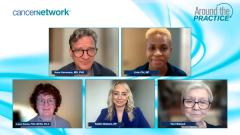
Support Networks for Patients With Renal Cell Carcinoma
Panelists share their perspective on establishing a support network for patients undergoing treatment for renal cell carcinoma.
Episodes in this series

Transcript:
Hans Hammers, MD, PhD: Some of the concern with families is like, “Dr Hammers, you're telling Terri to hold the drug at twice a day, you're giving her leeway to just stop the medication. Is that going to affect my outcome?” It typically does not as long as we feel that you still have reasonable exposure to the drugs, so you're still at the highest dose level and you still have some side effects. There is an initial learning curve with what can you tolerate, what is safe for you, and it may take some time to figure that out. As Laura indicated, we may initially see you quite frequently to make sure that it's safe, which we figure out very quickly whether or not this is just way too much of a dose. In fact, with some other drugs, we may feel that you might be under-dosed and we may need to increase some of the medications if you're still smiling and have sub-zero side effects. Then, we get almost worried that we may not give you enough drugs. So, it's a balancing act. It's important to get the feedback and to see you. Then, on the other hand, after this initial walk is done, the leash gets longer and longer and now, it's more like, I see you every few months with scans, you're doing well, you have so much experience and fortunately, you and Kaitlin can share your story about how you got to today. Laura, what other supportive care do you consider for patients that are being treated since fortunately, we have a team of other providers who can help us out. Do you want to comment on that a little bit?
Laura Sanza, PhD, MPAS, PA-C: Yes. Cancer care has become a multidisciplinary approach. I joke with patients that it takes a village and we work on building up a rather large village. From the cancer treatment itself, it might not just be oncologists, such as our team who is giving drugs, but it could be radiation oncologists and surgeons. Then, another line of support is the different doctors on teams that will help them with symptoms, or sequela from the treatment itself, for the cancer, like seeing rheumatologist's if they develop autoimmune adverse events, or cardiologists for blood pressure and cardiac issues that result directly sometimes from our treatment. There are dermatologists for those that have rashes that can't be controlled. We also have gastroenterologists, immunologists, and other professionals that the patients might see, but the last line of support comes from more from the social aspects. Of course, we do have oncology social workers associated with the cancer clinic and they're experts in talking to the patient and their families and learning what equipment they might need to facilitate for getting around the house, living independently, getting back and forth to appointments, who to speak to if there are financial of insurance, and who to speak to if there are psychosocial issues. I'll often have social workers reach out to me that they captured some questions and concerns from family members about depression that maybe I didn't pick-up on, and I assist in referrals to psychology or psychiatry. We also utilize an important team in the cancer clinic called the palliative care team, a group of doctors who are experts in overall symptom management. Gone are the days where we should think of just hospice when we say “palliative care,” and I do explain that to patients so that they don't panic when I say that you would benefit from palliative care. They do a great job of not just managing pain, but nausea, vomiting, appetite, breathing, pooping too much or too little, and not only do they address individual symptoms, but they look at the whole patient and make sure that they're prescribing medications that don't have drug interactions, or that they give a drug for patients who have potential problems and [adverse] effects like affecting heart rhythms. So, they make sure that they get an EKG to ensure that they're safe to be taking certain antinausea, or appetite stimulants. I like how they look at the whole patient and they take a multipronged approach, and in those patients that want to exhaust all of the meaningful and effective treatment options, they're very open to help them work out what their goals are. We always support when the patients’ goals are, “I want to keep trying aggressive treatment,” but we also want to be able to hear them when they want to take a more conservative approach or other approaches like medical management, support management, and symptom management, stop treatment, or even consider support systems such a hospice. We utilize physical therapists, occupational therapists, home health that goes to the house, and even recently, we started having referrals to music therapy. I see that we're growing the support systems available and I hope that we'll continue to do that and if the patient has interest in something particular and we don't have that option, then we work with our social workers to find other resources where they can get those things addressed.
Hans Hammers, MD, PhD: Wonderful. Thank you so much, Laura. Terri, you are also a great example for somebody who's doing well from a cancer perspective. You're doing exquisitely well from a cancer perspective, but also as someone who is seeing a palliative care team, right?
Terri Blalock: Yes, I am.
Hans Hammers, MD, PhD:Has it had some impact on some of the symptoms that you have with the joints, for example?
Terri Blalock: Yes. It has been very helpful.
Hans Hammers, MD, PhD: Wonderful.
Transcript edited for clarity.
Newsletter
Stay up to date on recent advances in the multidisciplinary approach to cancer.





































